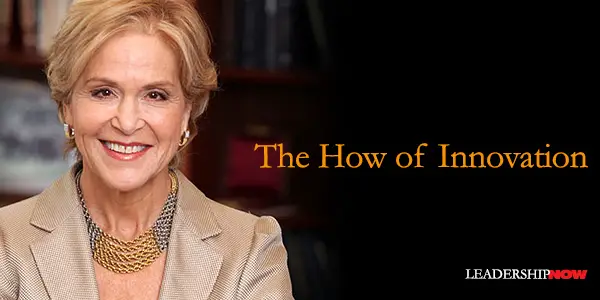The How of Innovation

JUDITH RODIN, the then president of the Rockefeller Foundation, delivered a month ago, a thought provoking presentation on the process of innovation and its importance to solving the challenges faced in the 21st century. She believes that innovation is a skill that can be taught. Additionally, believing too, that innovation is not just a product, it’s a process, the Rockefeller Foundation is focusing their funding on the how, not just on the what. Below I have pieced together some excerpts from that speech:
Edison was arguably the first modern innovator: not just an early electrical tinkerer, but a systems thinker—a visionary—who recognized that how you innovate is as important as what you invent.
Tim Brown, CEO and President of the design firm IDEO, said it well in a recent Harvard Business Review essay: “Edison’s genius,” Brown wrote, “lay in his ability to conceive a fully developed marketplace, not simply a discrete device. Edison understood that the light bulb was little more than a parlor-trick without a system of electric power generation and transmission to make it truly useful. So, he created that too.”
Today, for firms and institutions in every sector—from the smallest nonprofits, to the biggest corporations, and at every level and branch of government—the financial crisis affords a crucial moment for innovation. And, perhaps surprising to some, according to the Wall Street Journal, America’s largest companies spent nearly as much on innovation during the last quarter of 2008 as they did during the last quarter of 2007, even as revenue declined nearly 8 percent. Call it the lesson of the iPod, the fruit of Apple’s 42 percent increase in R&D expenditures during the downturn between 1999 and 2002: Businesses that sow seeds of innovation during periods of economic contraction, studies attest, perform significantly better over the long run than those that make big cuts.
Too often, though, innovation is considered a right-brain activity. It’s equated with intuition—with a feeling that emerges from the gut-up or cortex-down. But innovation can also be a left-brain skill—an achievement of methodical experimentation, not just “aha!” inspiration. Innovation is a way of working, not just something you work on. Not only a product; a process.
In today’s world, innovation processes look different for two important reasons: First, because of technology and global interdependence, innovations that work in one place can be transmitted, translated, and transformed to work in another. Second, the intellectual processes—the methodologies—that enable innovation are increasingly user-driven, and not only by people in Manhattan, but also by those in the far reaches of Mumbai and Manila.
Indeed, technology married with interdependence gives birth to momentous changes not only in the ways we lead our lives and engage with the world, but also in the ways we learn, store, and share knowledge. Information is no longer a static, objective article, classified by Dewey decimals. It’s fluid. Because of innovations like wiki, for example, shared, collaborative knowledge development emerges in real-time from people with diverse experiences and perspectives.
The implications are incredibly far-reaching, particularly when applying “open” innovation, an approach that emerges from the revelation that the collective wisdom of strangers can be channeled to develop solutions to an array of challenges.
This entirely new concept is called “collaborative competition.” Collaborative competition facilitates two broad areas of learning: First, it identifies clusters and blank spots among proposed solutions. Problem-solvers can easily see where their counterparts are focusing and where there may be white space to propose alternative possibilities. Second, it enables collaborative revision and iteration. The sooner applicants submit their proposals, the earlier they can see others’ ideas, and the further they can sharpen their own thinking.
Still, the what was less important than the how. Hundreds of people, who never met each other—and likely never will—joined together to solve a common problem, pooling their expertise and putting their ideas into practice. This is a new way of working only possible in an interdependent world. This is smart globalization.
Like the invention of other tools—the telephone, the electrical grid, the accountant—the evolution of innovation practices helps people connect and communicate, compete and collaborate with one another in fundamentally new ways. These practices emerge not a moment too soon, for today is our once-in-a-generation opening for innovation in health care and infrastructure, energy and education, the environment, and economy—21st-century challenges that cannot be mastered with 20th-century ideas.
* * *

Like us on
Instagram and
Facebook for additional leadership and personal development ideas.
Posted by Michael McKinney at 03:29 PM
Permalink
| Comments (0)
| This post is about Creativity & Innovation









